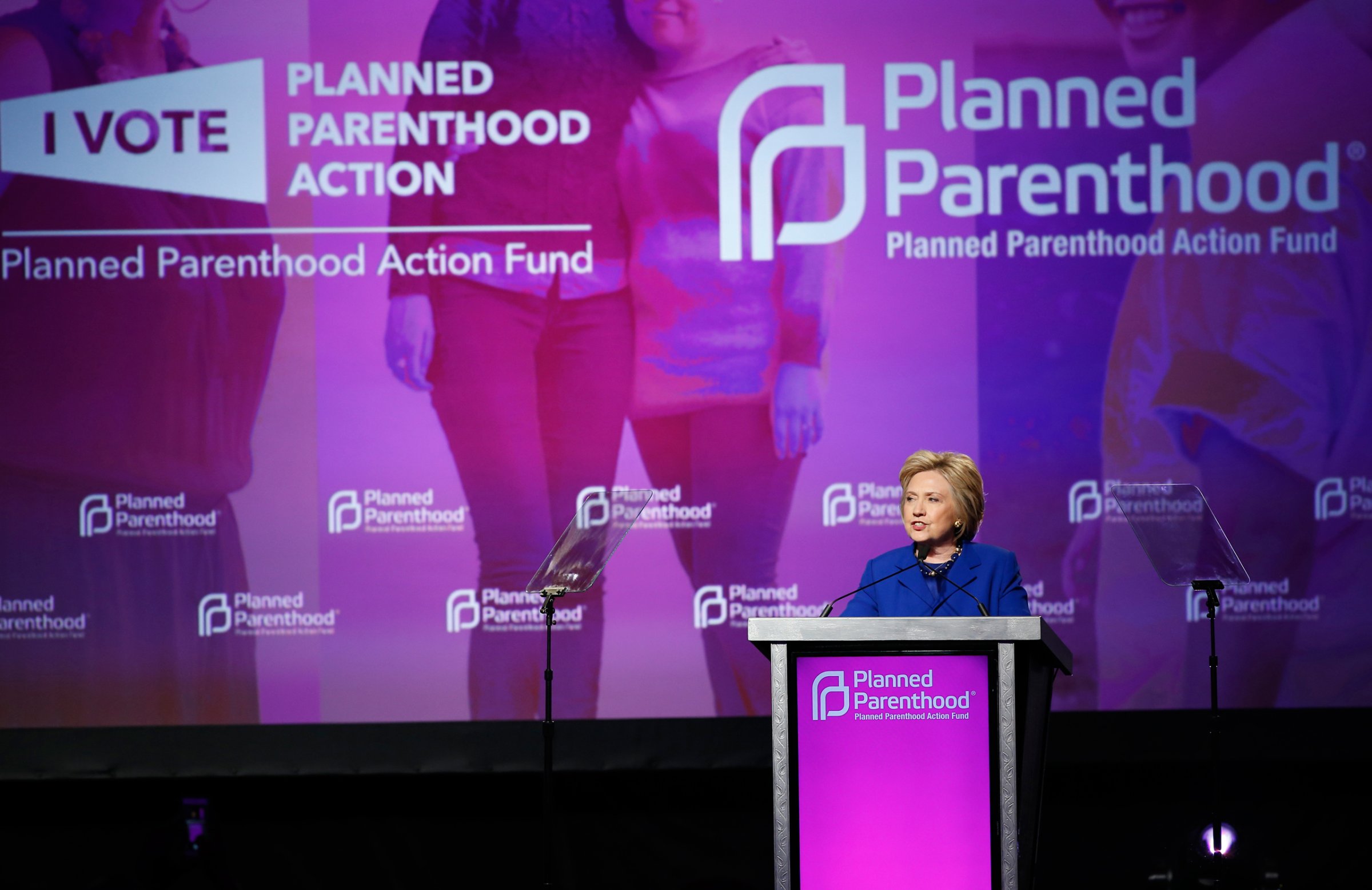
In her first speech since she became the first female major party presumptive nominee, Hillary Clinton put several traditionally sidelined “women’s issues” front and center.
Speaking to the Planned Parenthood Action Fund Friday, Clinton made clear that issues that affect women and families would be central to the messaging of her general election campaign against presumptive Republican nominee Donald Trump.
“For too long, issues like these have been dismissed by many as ‘women’s issues’ – as though that somehow makes them less worthy, secondary,” she said. “Well, yes, these are women’s issues. They’re also family issues. They’re economic issues. They’re justice issues. They’re fundamental to our country and our future.”
She also made clear that she will contrast that message with Trump’s record of comments about women.
“Donald assures us that, as President, he’ll be–and I quote again–’the best for women,’” she said, noting that he called women “pigs,” “dogs,” and “disgusting animals.” “Kind of hard to imagine counting on him to respect our fundamental rights,” she added.
Read More: Read Hillary Clinton’s Speech Hitting Donald Trump on Women’s Issues
The remarks recalled one of Clinton’s most famous speeches, her declaration at the United Nation’s Fourth World Congress on Women in Beijing in 1995 that “human rights are women’s rights, and women’s rights are human rights.”
Clinton linked access to reproductive health care to economic progress for the entire country, noting that the percentage of women who finish college is six times higher than it was before the legalization of birth control and that the movement of women into the labor force is responsible for $3.5 trillion of economic growth.
The speech was a departure for a major presidential candidate. Even Barack Obama, the only sitting president ever to address Planned Parenthood, did not say the word “abortion” when he gave an address on reproductive care access in 2013. In her speech Friday, Clinton said it 16 times.
“It is worth saying again: defending women’s health means defending access to abortion – not just in theory, but in reality,” Clinton said, as she called for the repeal of the Hyde Amendment, which prevents federal funding from being used to provide abortions.
Experts say that even pro-choice male candidates tend not to prioritize issues like abortion and paid family leave the way female candidates do.
“It’s not to say men don’t support those things, but it is women who make them a priority, who put them front and center, who make sure they don’t fall off the agenda,” says Debbie Walsh, director of the Center for Women and Politics at Rutgers University. “Women bring different lived experiences to government and public policy, and it affects the agenda they have when they’re in office.”
Clinton’s emphasis on women’s health and economic issues was also a way to swing at Trump, who has called for punishing women who get abortions (a comment he later reversed) and said the solution to unfair pay for women is for women to “do as good a job” as men.
She accused Trump of trying to “turn back the clock,” especially on issues affecting women’s lives. “When Donald Trump says, ‘Let’s make America great again,’ that is code for ‘let’s take America backward,’ she said. “Back to the days when abortion was illegal, women had far fewer options, and life for too many women and girls was limited.”
Trump voiced support for Planned Parenthood during the Republican primary, an unusual move at a time when many Republicans have been critical of the organization. He repeatedly said that Planned Parenthood does “very good work for millions of women,” including pap smears and breast cancer screenings, and said he’s received “thousands of letters from women that have been helped.” But he still supports removing federal funding as long as the organization performs abortions (by law, no federal funds are ever used to provide abortions.)
Clinton’s speech comes as she is bulking up her campaign staff for a general election run, including a staff shakeup to mobilize women voters in the general election. Mini Timmaraju, who ran women’s outreach during the primary, will become Women’s Vote Director. Neisha Blandin, who worked in grassroots engagement and African-American outreach during the primary, and Tori Taylor, formerly of Emily’s List and the Center for American Progress, will both become deputy women’s vote directors. The campaign says the women’s vote program will be focused on grassroots organizing and mobilizing a growing network of women surrogates.
Planned Parenthood endorsed Clinton in her primary fight against Vermont Sen. Bernie Sanders, in its first-ever primary endorsement. In her speech, Clinton drew parallels between her own historic candidacy and the 100-year old women’s health organization, which has faced near-constant attacks from conservatives who want to shut it down, especially in the last year.
“Together, we are taking on the attacks and together we’ll come out stronger,” she said. “Just like Planned Parenthood has, time and again.”
More Must-Reads from TIME
- Inside Elon Musk’s War on Washington
- Why Do More Young Adults Have Cancer?
- Colman Domingo Leads With Radical Love
- 11 New Books to Read in February
- How to Get Better at Doing Things Alone
- Cecily Strong on Goober the Clown
- Column: The Rise of America’s Broligarchy
- Introducing the 2025 Closers
Write to Charlotte Alter at charlotte.alter@time.com